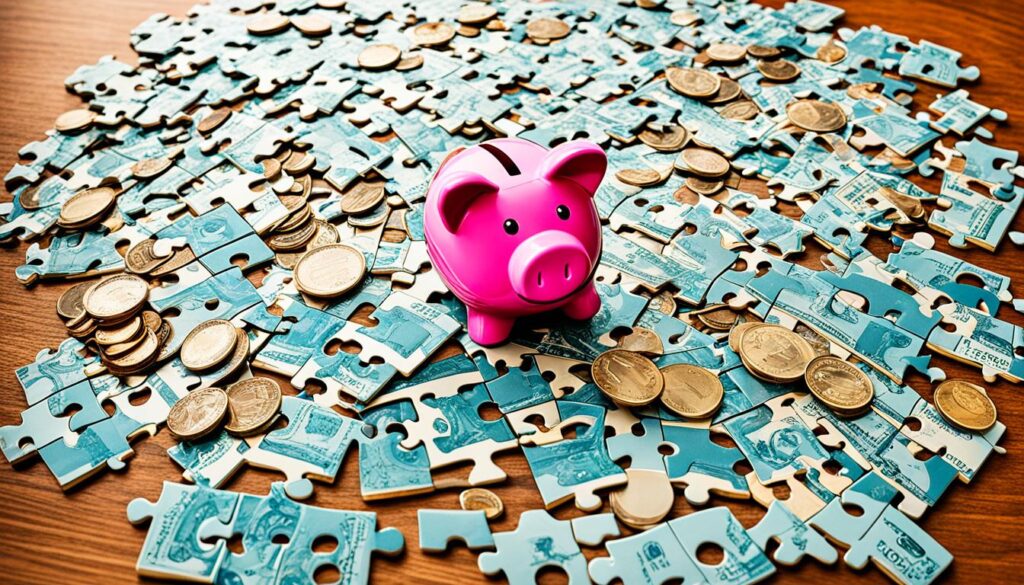Welcome to this easy guide on budgeting and saving. In our world today, managing money wisely is crucial. Are you starting on your financial path or rebooting your money management? Learning to budget and save is key for a bright, secure future.
Creating a budget and setting financial goals helps you handle money better. You can keep track of spending, steer clear of mistakes, and use your money smartly through budgeting. Saving then becomes essential as you aim for a stable safety net and long-range financial dreams.
This guide will take you through budgeting and saving with useful advice. We’ll show you how to make a basic budget and set realistic targets. Armed with know-how and tools, you’re set for financial steadiness.
Let’s start this money management adventure and learn to budget and save efficiently. With focus and discipline, you’re on your way to fulfilling your financial goals. A promising future awaits you and those you care for.

Key Takeaways:
- Create a budget plan and set financial goals to effectively manage your income and expenses.
- Track your spending, avoid common budgeting pitfalls, and adjust your budget as needed.
- Set realistic and achievable goals to stay motivated and avoid disappointment.
- Develop strategies for budgeting with an inconsistent income and ensure you have a backup plan for unexpected challenges.
- Assess your income and expenses to gain a clear understanding of your financial situation.
How to Create a Basic Budget Plan
Making a basic budget plan is your first step to take charge of your money. This helps you reach your financial dreams. By keeping track of what you earn and spend, you can split your cash wisely.
Listing Your Basic Monthly Expenses
Begin by noting down your monthly must-pays. Usually, these are things like:
- Food
- Shelter (rent or mortgage)
- Utility bills
Allocating Funds for Different Categories
After jotting down your basics, think about other important expenses. You might consider:
- Transportation
- Clothing
- Emergency savings
Your financial picture is unique. So, shape your budget to fit your individual goals and what’s crucial for you. Pick what you treasure most and decide on your financial focus.
Tracking Progress and Staying Accountable
Keeping an eye on your budget is key to success. Checking your income and outgoings helps you see if you’re on track. It shows how well you’re moving toward your aims.
“A budget is telling your money where to go, instead of wondering where it went.”—Dave Ramsey
There are several ways to monitor your budget, like:
- Maintaining a spreadsheet
- Using a budgeting app
- Keeping receipts and manually tracking expenses
Select the method that suits you best. It’s about personal choice and what effectively works for you.
Remember, setting up a budget is just starting. Keep examining and tweaking your plan. Stay true to it. Doing so will guide you to financial security and achieving your dreams.
| Budget Category | Percentage of Income Allocated |
|---|---|
| Food | 15% |
| Shelter (rent or mortgage) | 30% |
| Utility bills | 10% |
| Transportation | 10% |
| Clothing | 5% |
| Emergency savings | 10% |
| Discretionary spending | 20% |
Beware of Budgeting Pitfalls
Budgeting helps manage finances, but it’s important to know the common pitfalls. These pitfalls can slow your progress. By dodging them, you keep control of your money and reach your financial goals.
Making Only Minimum Payments on Credit Card Balances
Paying just the minimum on credit cards is a trap. It feels easy short term, but it leads to long-term debt and high interest. Try to pay more than the minimum each month. This helps avoid extra debt.
Using Credit Cards to Pay Big Bills
Using credit cards for large bills can seem helpful, but it’s risky. It can start a cycle of debt. It’s better to use regular income for bills. Save credit cards for emergencies or surprises.
Falling for Debt Consolidation Scams
Debt consolidation can simplify debt management. Yet, it’s vital to dodge scams. Scammers might offer fast relief but charge a lot. Always look into reputable companies and get professional advice before deciding.
Knowing these budgeting pitfalls can lead to wiser financial decisions. Budgeting takes discipline and smart choices. With the right approach, you can create good budgeting habits. These habits pave the way to financial stability.

Setting Attainable Goals Each Month
Setting realistic financial goals is a key to successful budgeting. It’s good to have big dreams. But, goals need to be reachable to keep you motivated and avoid disappointment. Breaking down big goals into smaller parts helps understand your finances better. It also helps make progress over time.
It’s useful to set financial goals regularly, like every week or month. By setting small goals monthly, you can focus better and keep on track with your finances. These goals can fit your personal needs and situation.
Benefits of Setting Attainable Goals
Setting goals you can reach has several benefits:
- Increased motivation: Goals that are attainable keep you motivated and committed. Hitting these smaller targets boosts confidence and encourages more progress.
- Better financial insight: Regular goal setting helps understand your income, expenses, and spending better. This can show you what to improve and help make smarter financial decisions.
- Avoiding setbacks: Unrealistic goals can lead to disappointment. By setting realistic goals, you can avoid these setbacks and stay positive on your financial journey.
Setting goals you can reach monthly is key to budgeting well. It helps you stay driven, understand your finances better, and steer clear of setbacks. By aiming for achievable targets, you can slowly reach your big financial dreams.

| Key Tips for Setting Attainable Financial Goals |
|---|
| 1. Be specific: Define your financial goals clearly. Instead of just “save money,” aim to “save $500 for a summer vacation.” |
| 2. Make them measurable: Have a clear way to see your progress. This helps you stay on track and celebrate successes. |
| 3. Set a realistic timeline: Break your goals into timeframes you can manage. Figure out what you can achieve each month and adjust your goals as needed. |
| 4. Prioritize your goals: Focus on what goals are most important to you. This way, you can use your resources and time wisely. |
| 5. Review and adjust regularly: Keep checking your goals and your progress. Change your goals when needed to keep them relevant and reachable. |
Budgeting with an Inconsistent Income
Dealing with finances gets hard when your income changes often. Budgeting with inconsistent income needs you to be flexible. You have to be ready for financial ups and downs.
Start by figuring out which bills are most important. You must pay some expenses, like housing and insurance, no matter what. This step makes sure you cover your basic needs, even in tough times.
It’s smart to plan for tough times before they happen. Save some money when you earn more. This creates a safety net for when your income drops. This way, you lower stress and feel more secure.
A backup plan brings you peace of mind and safety. It helps you handle tough times without hurting your finances. Being ready for anything lets you deal with income changes confidently.
Along with sorting out bills and having a backup plan, watching your spending closely is key. Keep an eye on what you’re buying. Cutting back is easier when you understand where your money goes. This ensures your budget fits with your changing income.
Remember, budgeting with an inconsistent income means being open to change and proactive. By managing your expenses, saving for the future, and tracking your spending, you can stay stable financially despite an unpredictable income.

Backup Plan: What to Include
| Components of a Backup Plan |
|---|
| 1. Emergency Fund |
| 2. Side Gig or Freelance Work |
| 3. Reduced Expenses |
| 4. Income Diversification |
| 5. Temporary or Part-Time Employment |
Assess Your Income and Expenses
Creating a budget starts with knowing your income and what you spend. This is key for good financial planning. By knowing your monthly income and expenses, you can plan how to use your money wisely.
To figure out your income, add up all the money you make in a month. This includes your job, any freelance work, investments, or money from renting out property. If you get a regular paycheck, find out what you take home after taxes. For irregular income, average out what you’ve made in recent months.
Now, let’s look at your expenses. Track what you spend for at least a month. This shows you where your money goes. Separate your expenses into fixed costs and things you spend on that change from month to month. This helps spot spending habits you might want to change.
Fixed expenses don’t change much every month. These include your rent or mortgage, utility bills, insurance, and loan payments. Expenses that change, like food, eating out, fun activities, and other shopping, are variable costs.
A smart way to keep track of spending is by using a budgeting app. These apps help you see how you spend in different categories. Mint, YNAB, and Personal Capital are some apps that can help.
Knowing your income and what you spend gives you a full picture of your finances. This is crucial for making a budget that fits your life and dreams.
| Monthly Income | Monthly Expenses |
|---|---|
| Salary: $4,000 | Rent/Mortgage: $1,500 |
| Freelance Income: $1,200 | Utilities: $200 |
| Investment Returns: $500 | Insurance Premiums: $100 |
| Rental Income: $300 | Loan Repayments: $250 |

Keeping track of expenses shines a light on your spending. It shows where your money goes and opens doors for positive changes.
Set Financial Goals
Setting financial goals is key in budgeting. You might be saving for a new home, planning retirement, or paying off debt. Clear financial goals give you direction and motivation.
It’s important to think about short-term and long-term goals. Short-term goals could be saving for a trip, clearing a credit card, or having an emergency fund. For the long haul, think about your child’s education or a cozy retirement.
After setting goals, prioritize your spending. This helps you spend your money wisely. It aligns your expenses with your goals.
Divide your spending into essential and discretionary categories. Essentials include housing, utilities, transportation, and food. These are items you must have every month.

Next, look at your discretionary spending. This covers dining out, fun, and shopping. Enjoy these, but keep your goals in mind. Consider cutting back here to save more for your goals.
“The key to financial success is knowing the difference between needs and wants.”
By being mindful of your spending, you can move closer to your financial goals. It’s all about balancing current enjoyment and future savings.
Sample Table: Prioritizing Spending Based on Financial Goals
| Financial Goal | Prioritization Level |
|---|---|
| Pay off credit card debt | High |
| Save for down payment on a home | High |
| Contribute to retirement savings | Medium |
| Save for a dream vacation | Low |
In the table above, paying off credit card debt and saving for a house are top priorities. Retirement savings are medium priority, signifying their importance, but they can wait. A dream vacation is a low priority, meaning adjust its funding as needed.
By defining and ordering your financial goals, you can guide your spending to achieve your long-term dreams.
Create a Budgeting Plan
Creating a budgeting plan helps you gain financial stability. It shows you how to allocate your money each month. This way, you can manage your income, expenses, and goals well. A good budget helps you know where your money goes. It helps you spend it wisely.
To start, figure out your income and monthly expenses. Add up what you earn and track your spending for a month. Sort your expenses into fixed and variable groups. This shows your spending habits. It helps you decide what to spend money on.
Think about your financial goals next. This could be saving for a house, paying off debt, or planning a trip. Put money toward these goals in your budget. Having specific goals keeps you focused and motivated.
Your budget should cover essential expenses like rent, utilities, transport, and food. These are top priority to meet your basic needs. Also, save for emergencies or retirement. This way, you build a safety net for the future.
Include debt repayment in your budget too. Use some money to pay off credit cards, loans, or other debts. Lowering your debt lets you save more and reach your goals faster.
Finally, add some fun money to your budget. This is for entertainment, eating out, and hobbies. This ensures you enjoy life while keeping your finances healthy.
Example Budgeting Plan
| Expense Category | Allocation |
|---|---|
| Essential Expenses | 50% |
| Savings Goals | 20% |
| Debt Repayment | 15% |
| Discretionary Spending | 15% |
A good budget is realistic and adapted when needed. Check and adjust your budget regularly. This ensures it fits your current finances and goals. By sticking to a budget, you control your finances. You’re on your way to long-term financial well-being.

Track Your Spending
Keeping an eye on your spending is crucial for sticking to a budget. By noting down your expenses, you see where your money goes. This helps you follow your budget plan well. There are many tools and methods to help with this.
Utilize Budgeting Apps
Budgeting apps make it easy to watch your spending anywhere. You can link your financial accounts to these apps. They automatically sort your spending and show you useful charts and reports. These insights assist you in spotting spending habits that need improvement. Mint, YNAB (You Need a Budget), and Personal Capital are among the top choices.
Keep a Spreadsheet
If you like being more involved, use a spreadsheet. You can use Microsoft Excel, Google Sheets, or any other program. Just list your income and what you spend money on. Then, track it yourself. This way offers more control and a full look at your spending habits.
Review and Analyze Your Expenses Regularly
It’s important to check your expenses often. Every month, take time to look over what you’ve spent. You want to spot any habits or repeat expenses that need changing. Maybe you’re spending too much on eating out or on subscriptions. A detailed look can lead you to smarter money choices.
Watching where your money goes is key to financial success. It makes you think more about your spending. This lets you take charge of your money’s future.
Staying consistent and disciplined is the secret to good budgeting. By monitoring your spending, you keep true to your financial goals. This way, you make real progress towards them.

| Advantages of Tracking Your Spending | Disadvantages of Not Tracking Your Spending |
|---|---|
|
|
Adjust and Fine-Tune Your Budget
Making a budget plan is a continuous task that needs regular updates and tweaks. As your finances and what you want change, you must check and change your budget. This ensures it works well and meets your goals.
Changes in your life like a new job, unexpected bills, or big life moments can affect your budget. For instance, getting a raise means you might adjust your budget to save more or pay off debt.
But, sudden costs like fixing your house or health emergencies might need you to change your budget for a while. Updating your budget helps you manage these surprise costs. It stops them from messing up your financial plans.
Reviewing your budget regularly helps you see if it’s working. You might find you’re spending too much in some areas. Or, you could see chances to put more money towards your goals.
Here are steps to properly adjust and fine-tune your budget:
1. Review Your Income and Expenses
First, look at how much you earn and spend. Check your spending habits to see where you can spend less. This review gives you a clear picture of your finances. It helps you make smart changes to your budget.
2. Prioritize Your Goals
Think about what you want to achieve with your money. Then, change your budget to focus on these goals. It could be saving for a house, paying off loans, or getting ready for retirement. Matching your budget with your aims is key to success.
3. Allocate Funds Accordingly
After checking your income, expenses, and goals, update your budget. Make sure your spending matches your current needs and what’s important to you. This might mean moving money around or changing things based on your income or bills.
4. Track Your Progress
Keep an eye on your spending and look over your budget often. This helps you see how you’re doing. Tracking what you spend keeps you honest and lets you tweak your budget as needed. Use budget tools or apps to make this easier and to see your financial growth.
Always remember, updating your budget is something you should do all the time. Make it a routine to check your budget, especially after big changes in your life. By being proactive with your budget, you can make sure it stays helpful in reaching your financial dreams.

Build an Emergency Fund
Building an emergency fund is key for your budget. Life can bring surprises you didn’t expect. These could be a sudden job loss, a health scare, or even your car breaking down. Having money set aside gives you peace of mind and makes sure you stay financially secure.
Start by figuring out how much you need to save. It’s often said that three to six months’ worth of living costs is best. Look at your monthly spending. This includes your house payment or rent, bills for utilities, what you spend getting around, groceries, and other musts. This helps you know what amount you’re aiming for.
Next, make a savings goal for your emergency fund. Break this goal into parts you can manage, like saving a bit of money each month or a portion of what you earn. Having clear, doable goals helps keep you on track to add to your emergency funds regularly.
Try making your savings happen on their own. Open a savings account just for emergencies and set up automatic transfers from your paycheck. This takes the hassle out of remembering to save. It makes sure a part of your money is always going where it should.
Why an Emergency Fund Is Important
“An emergency fund is like having a financial safety net. It provides a buffer when unexpected expenses occur, preventing you from relying on credit cards or loans that could accumulate debt.”
An emergency fund stops you from needing to use credit cards or loans in hard times. This way, you avoid falling into debt over sudden expenses. Instead, you have ready cash to deal with whatever comes.
Having an emergency fund also gives you a feeling of security. Knowing you’re prepared for emergencies can lessen worry and help you confidently manage difficult moments.
While saving up three to six months’ expenses sounds tough, starting small and sticking with it helps. Even a little cash saved every week grows over time. Remember, creating an emergency fund is a step-by-step process, and every little bit adds up.
Building an emergency fund is much like constructing a strong safety net. It requires time and effort, but the sense of security and financial safety it offers is worth a lot. Begin today by planning how to save within your budget.
| Benefits of Building an Emergency Fund | Tips for Building an Emergency Fund |
|---|---|
|
|
Tools to Aid Your Financial Journey
Budgeting and saving can seem tough. But, many tools are there to help. Apps like Mint and YNAB let you track spending and set budgets easily. They give insights on where your money goes. This helps you make better financial choices.
Online savings calculators are also great. They consider your income, savings goals, and timeline. This way, you get a clear plan to hit your financial targets. Whether it’s for a house down payment or retirement, calculators keep you on track.
Financial blogs and forums are key too. They offer a ton of info and advice. You can learn about budgeting, investments, and get your questions answered. Being part of these communities boosts your knowledge and confidence.
Use these tools and resources on your financial journey. Whether it’s apps, calculators, or online advice, they can help. They make managing money easier and lead you towards financial success.